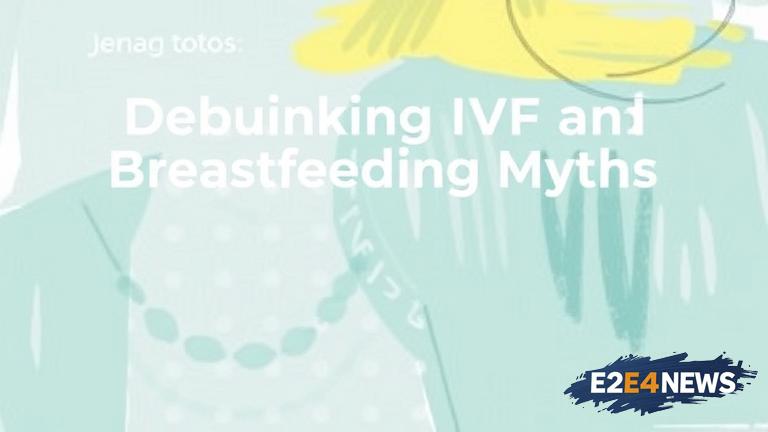As a new mother, navigating the world of parenting can be overwhelming, especially when it comes to IVF and breastfeeding. With so many myths and misconceptions circulating, it’s essential to separate fact from fiction. In vitro fertilization (IVF) is a common fertility treatment, but many women are unsure about its effects on breastfeeding. One common myth is that IVF babies are less likely to breastfeed, but research shows that this is not the case. In fact, studies have found that IVF babies are just as likely to breastfeed as naturally conceived babies. Another myth is that breastfeeding is not possible after IVF, but this is also untrue. With proper lactation support and guidance, many mothers who have undergone IVF are able to successfully breastfeed their babies. However, it’s essential to note that some IVF medications may affect milk production, so it’s crucial to discuss breastfeeding plans with your healthcare provider. Breastfeeding has numerous benefits for both mother and baby, including reducing the risk of breast and ovarian cancer, type 2 diabetes, and postpartum depression. For babies, breastfeeding provides essential nutrients, boosts their immune system, and supports healthy development. Despite these benefits, many new mothers face challenges when it comes to breastfeeding, including latching issues, nipple soreness, and low milk supply. But with the right support and resources, many of these challenges can be overcome. It’s also important to remember that breastfeeding is not a one-size-fits-all approach, and what works for one mother may not work for another. Some mothers may need to supplement with formula or express milk, while others may be able to exclusively breastfeed. Ultimately, the decision to breastfeed is a personal one, and new mothers should be supported and empowered to make the best choices for their babies. By debunking common myths and misconceptions, new mothers can feel more confident and informed when it comes to IVF and breastfeeding. It’s also essential to recognize that breastfeeding is not just about the mother, but also about the baby. Babies have a natural instinct to breastfeed, and with proper support and guidance, they can learn to latch and feed effectively. Additionally, breastfeeding can help new mothers bond with their babies, promoting a sense of closeness and connection. In conclusion, IVF and breastfeeding are not mutually exclusive, and with the right support and resources, many new mothers can successfully breastfeed their babies. By separating fact from fiction and getting the inside scoop on common myths and misconceptions, new mothers can make informed decisions and feel more confident in their ability to provide the best possible care for their babies. Furthermore, it’s essential to recognize the importance of lactation support and guidance, as well as the need for ongoing education and resources. By working together, healthcare providers, lactation consultants, and new mothers can promote a culture of breastfeeding support and empowerment. As research continues to evolve, it’s likely that we will learn more about the complex relationships between IVF, breastfeeding, and maternal and infant health. For now, it’s essential to focus on providing new mothers with accurate and unbiased information, empowering them to make the best choices for their babies. With the right support and resources, new mothers can overcome common challenges and achieve their breastfeeding goals, promoting a healthier and happier start for their babies. Moreover, it’s crucial to address the social and cultural barriers that may prevent new mothers from breastfeeding, including lack of paid family leave, inadequate lactation facilities, and societal stigma. By addressing these barriers and promoting a culture of breastfeeding support, we can help new mothers feel more confident and empowered to breastfeed their babies. Ultimately, the decision to breastfeed is a personal one, and new mothers should be supported and empowered to make the best choices for their babies, without fear of judgment or criticism.
